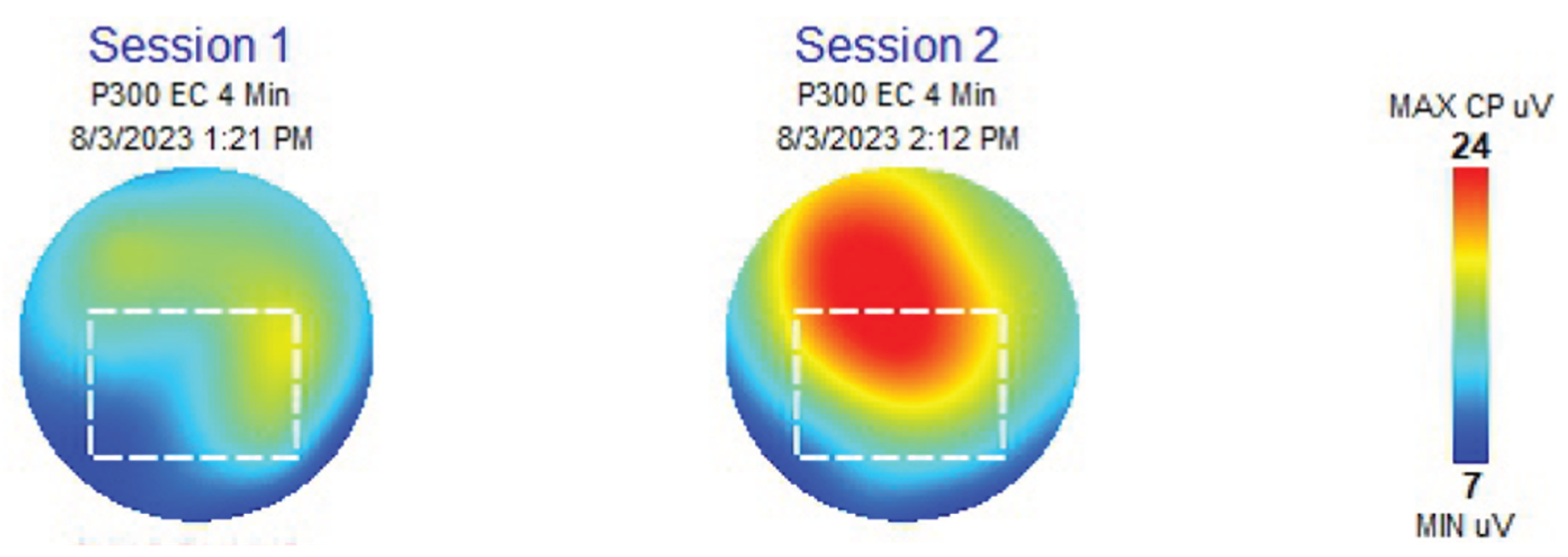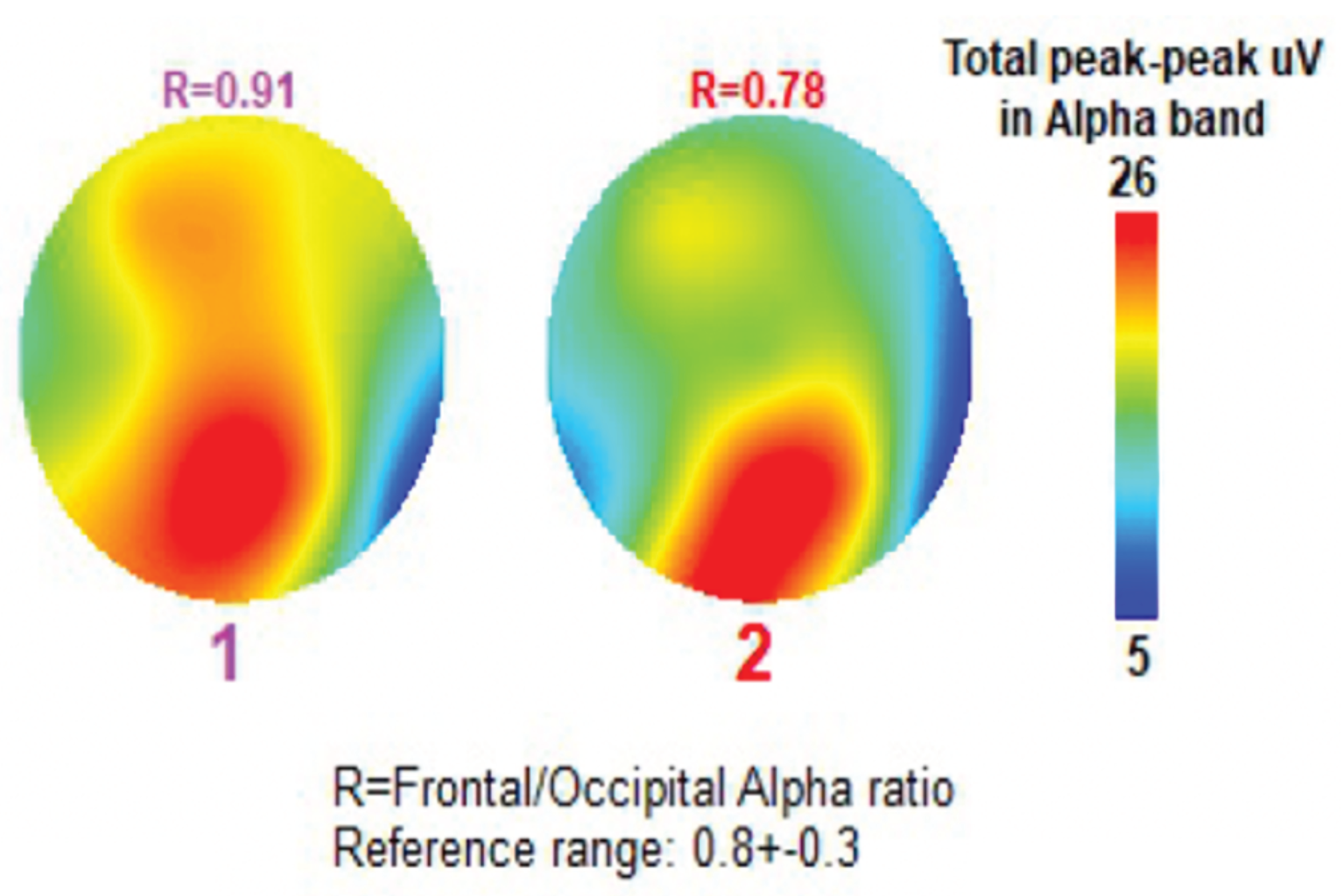1. Introduction
This case series aims to understand the impact of Titan-iR Pro advanced & deep spectrum biotherapeutic intervention on brain function in individuals at risk for cognitive decline and further neurological disorders. Here we present 15 subjects who underwent clinical EEG-ERP testing before, and following, a 15-minute session of photobiomodulation therapy.
2. Materials and Methods
Procedure
After clinical interviews and assessments, the participants (n=15) received an EEG scan with an oddball P300 stimulus, using the WAVi
TM system. Details of the scan, system, procedure, and EEG extraction have been detailed elsewhere and include a 4-min oddball audio ERP [
4]. The EEG study was approved by the Solutions Institutional Review Board and written informed consent was obtained from the participant before scanning.
The intervention was administered using the Titan-iR Pro™ Deep Biotherapeutic Device. The interventional platform focuses on utilizing a proprietary array of advanced + deep spectrum wavelengths to specific areas of the pre-frontal cortex that are responsible for mood and cognition. Participants underwent a single 15-minute, high-powered, continuous treatment protocol, which was controlled using the Titan-iR Mobile Application. The Titan-iR Mobile Application allows the hardware to administer a pre-specified dose of therapy as determined by the energy delivered over a set period. During treatment, participants were allowed to resume normal relaxed measures and did not perform any extra movements or activities.
3. Results
Because of the small sample size, the difference in pre-intervention and post-intervention EEG results was analyzed using McNemar’s test to evaluate the change in state to test the null hypothesis that the treatment had no effect. The subjects were categorized into 2 groups: below and above normal on the two ERP metrics discussed above, plus physical reaction time which is also known to correspond with conditions affecting cognition [
1]. Below normal constituted previously published target values for P300 amplitude (14uV here); latency (300ms); and reaction time (300ms) [
5]. Subjects who scored above normal for 2 out of these 3 were classified as high and those who were 1 or below (out of 3) were classified as low.
Before treatment, 3 subjects scored high (again, above normal in 2/3 categories); and post-treatment 10 subjects scored high resulting in chi-squared values of 3.8 and a P-value near our P<0.05 cutoff used to reject the null hypothesis that the treatment had no effect. Concluding the treatment had a statistically significant effect amongst participants.
3.1. Observations of an Individual Participant
A 44-year-old former Division One college football player, who had received numerous concussions during his career, was measured pre- and post-intervention to evaluate the effects of Titan-IR Pro on his cognitive performance (
Table 1).
Further analysis of this individual shows changes in peak alpha amplitudes in front, mid, and rear brain regions (
Figure 1). Alpha is the dominant frequency of the human EEG and, as with the P300, the frequency and power of the alpha band provide information on brain function.
Figure 2 shows the topography of the alpha distribution across the scalp for this subject before and after intervention. As often seen in PPCS recovery, this subject showed a healthy return to occipital dominance post-intervention.
4. Discussion
This heterogeneous sample of participants showed improved cognition following Titan-iR Pro® interventional treatment as measured by EEG-evoked responses and reaction time. It is important to consider the diverse medical histories within this population. Alongside concussions, individuals may have experienced other medical conditions or injuries that could have influenced their cognitive abilities. These additional factors must be considered when interpreting the findings, as they may contribute to the lower-than-expected number of high performers in the study.
This individual case study is particularly significant due to the cumulative impact of multiple concussions experienced throughout their athletic career, while also suffering from mild-to-moderate cognitive fog and depressive episodes. While frontal locations of F3-FZ-F4 are responsible for mood and cognition, alpha power is normally occipitally dominant in resting states. It has been shown to move frontal with conditions such as prolonged-post concussion syndrome (PPCS) where symptom resolution may coincide with a return to occipital dominance [
6]. Concussions and traumatic brain injuries are known to increase the risk of long-term cognitive impairments, such as memory deficits, attention problems, executive dysfunction, and depression. The intervention implemented in this study aimed to address the specific cognitive challenges faced by former athletes with a history of concussions. The goal was to optimize brain function, promote neural recovery in brain regions, and improve overall cognitive performance.
This research holds broader implications beyond the individual case. It contributes to our understanding of the potential long-term consequences of repeated concussions in athletes and highlights the need for targeted interventions and comprehensive support systems for those at risk. By identifying effective strategies for cognitive rehabilitation, healthcare professionals can better assist individuals with a history of concussions in regaining optimal cognitive functioning and improving their overall quality of life.
Given that most of these participants are considered healthy, it would be interesting to expand this study on a more homogeneous sample of patients suffering from a single condition such as depression or PPCS. Whilst the participant with a history of concussion did show point of care improvement following the intervention, along with long-term durability with the treatment (up to 60 days), it is important to conduct further research, with a larger sample size, to validate these findings.
Author Contributions
Conceptualization, D.O. and I.S.; methodology, D.O.; formal analysis, D.O.; data curation, D.O. and A.P.; writing—original draft preparation, D.O and I.S.; writing—review and editing, I.S..; supervision, D.O.; project administration, D.O. All authors have read and agreed to the published version of the manuscript.
Funding
This research received no external funding.
Institutional Review Board Statement
The EEG study was approved by the Solutions Institutional Review Board.
Informed Consent Statement
Written informed consent was obtained from all subjects involved in the study. Recruitment began on the 1st of July 2023 and ended on the 15th of August 2023. The study was completed between the 28th of July and the 26th of August.
Data Availability Statement
The raw data and any other materials presented in this manuscript are available upon request from the corresponding author.
Conflicts of Interest
David Oakley is an employee of WAVi Co., the company that provided the EEG equipment and data analysis. Iain Strickland and Anna Parievsky are employees of Medify Inc. and contributed to the statistical analysis applied to the data and the writing of the manuscript.
References
- Polich, J. Clinical application of the P300 event-related brain potential. Physical Medicine and Rehabilitation Clinics. 2004, 15, 133–161. [Google Scholar] [CrossRef] [PubMed]
- Golob, E.J.; Ringman, J.M.; Irimajiri, R.; Bright, S.; Schaffer, B.; Medina, L.D.; Starr, A. Cortical event-related potentials in preclinical familial Alzheimer disease. Neurology. 2009, 73, 1649–1655. [Google Scholar] [CrossRef] [PubMed]
- Gordeev, S.A. The use of endogenous P 300 event-related potentials of the brain for assessing cognitive functions in healthy subjects and in clinical practice. Human physiology. 2007, 33, 236–246. [Google Scholar] [CrossRef]
- Clayton, G.; Davis, N.; Holliday, A.; Joffe, D.; Oakley, D.S.; Palermo, F.X.; Poddar, S.; Rueda, M. In-clinic event related potentials after sports concussion: A 4-year study. Journal of pediatric rehabilitation medicine. 2020, 13, 81–92. [Google Scholar] [CrossRef] [PubMed]
- Oakley, D.S.; Fosse, K.; Gerwick, E.; Joffe, D.; Oakley, D.A.; Prather, A.; Lucini, F.A.; Palermo, F.X. P300 Parameters Over the Lifespan: Validating Target Ranges from an In-Clinic Platform. bioRxiv. 2021. [CrossRef]
- Mortazavi, M.; Lucini, F.A.; Joffe, D.; Oakley, D.S. Electrophysiological trajectories of concussion recovery: From acute to prolonged stages in late teenagers. Journal of pediatric rehabilitation medicine. 2023, 16, 287–299. [Google Scholar] [CrossRef] [PubMed]
|
Disclaimer/Publisher’s Note: The statements, opinions and data contained in all publications are solely those of the individual author(s) and contributor(s) and not of MDPI and/or the editor(s). MDPI and/or the editor(s) disclaim responsibility for any injury to people or property resulting from any ideas, methods, instructions or products referred to in the content. |
© 2024 by the authors. Licensee MDPI, Basel, Switzerland. This article is an open access article distributed under the terms and conditions of the Creative Commons Attribution (CC BY) license (http://creativecommons.org/licenses/by/4.0/).






